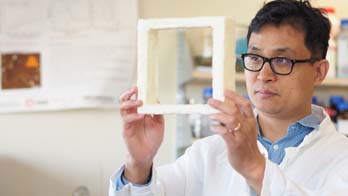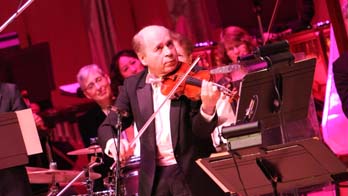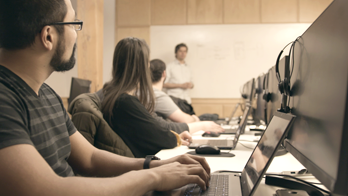Mandela Kuet, a passionate believer in the power of personal development, started an organization that supports at-risk youth who want to stay out of gangs. He has also teamed up with an Indigenous activist to build bonds between Winnipeg’s newcomer and Indigenous communities.
#ImmigrationMatters in Winnipeg, Manitoba – Bridging cultures to change lives
Bridging cultures to change lives
October 3, 2023
Share:

“Winnipeg’s Indigenous and newcomer communities have similar histories of racism, exclusion, poverty and trauma”, says Mandela Kuet. Yet, because of misconceptions and competition for resources, conflicts between the 2 can bubble up. He wants to help the 2 communities understand each other.
“By building stronger relationships, we can look out for one other”, he says.
Mandela arrived in Winnipeg from South Sudan in the late 1990s, at the age of 13, and grew up in the city’s predominantly Indigenous North End, where he still lives. As more newcomers arrive, Mandela has noticed growing hostility between the groups.
He thinks resource scarcity and stereotypes are behind the tension. “Each group thinks the other gets more opportunities”, he says.
Another problem is fear: gangs in the North End target vulnerable, economically disadvantaged youth for their recruitment. Residents who feel unsafe sometimes view gang members from the other culture as the source of the problem.
Mandela tries to help both communities understand each other’s struggles. When he talks to newcomers, he explains the impacts of colonialism, residential schools and intergenerational trauma on Indigenous Peoples. When he talks to Indigenous youth, he points out how newcomers may have experienced war, fear, loss and scarcity. “Everyone,” he emphasizes, “is just trying to survive.”
In December 2019, Mandela teamed up with Indigenous activist Michael Redhead Champagne to co-create Real Talk Winnipeg, a podcast encouraging peace and cooperation between the 2 main North End communities by dispelling stereotypes. For example, episodes have tackled the issue of government supports, discussing how personal circumstances, not race, influence access to resources. Others have focused on parenting and the stereotypes associated with long hair or dreadlocks.
Mandela is a driven, creative and passionate person, whose community work builds bridges. He’s an example of the type of leader that we need now more than ever.
Michael Redhead Champagne, Indigenous community activist, Winnipeg
As a result, the podcast tries to generate a ripple effect as listeners bring the positive ideas they hear into their circles of influence, encouraging them to become well informed and challenge others when negative stereotypes are enforced.
“Mandela brings a rational, calm energy and unique sense of humour to the podcast”, says Michael. “He works from a very heart-centred place to create opportunities for folks of all backgrounds in the North End, and to build relationships between different communities.”
The Hood Fams, a not-for-profit organization that offers education and support to Indigenous, racialized and newcomer youth to help them stay out of the justice system, is another of Mandela’s initiatives. It runs a drop-in space, plans community initiatives, and provides youth with one-on-one personal development and mentorship that harnesses their own motivation to change. Mandela aims to grow it into a national organization.
Meanwhile, he’s also personally nurturing the next generation of leaders.
Gode Katembo, a community builder now in his mid-20s who grew up in the nearby West End, says Mandela has been an influential mentor and inspiration. A few years ago, Gode recognized a need for youth programs to keep inner-city kids off the streets and out of gangs. He was trying to organize a response when Mandela noticed and offered to coach him.
Today, Gode is the founder of 2 organizations that use sports as a catalyst for positive change: Sports Without Boundaries and the Manitoba African Cup of Nations. Both organizations build community by making sports affordable and accessible.
“If not for Mandela, I probably would not have these initiatives today”, says Gode. “I became who I am under his wings.”
By partnering with Indigenous community leaders and working with The Hood Fams, Mandela is bridging the gap between newcomer and Indigenous residents, and giving youth the tools to change their lives and make a difference.
Immigration profile: Winnipeg, Manitoba
Quick facts:
- Immigrants in Winnipeg represent a quarter (25%) of the population, with recent immigrants (between 2016 and 2021) making up 22%.
- Almost half of all youth gang members are under the age of 18, with most between 16 and 18 years old.
- More than 1 in 4 people employed in the social assistance sector were born outside of Canada.
Did you know?
- Winnipeg has the largest urban Indigenous population of any city across Canada, increasing by 9.4% since 2016—nearly double the rise of the city’s general population.
You may also be interested in ...
 Partnering with an Indigenous community to fight plastic pollution
Partnering with an Indigenous community to fight plastic pollution
Dr. Feng Jiang, a University of British Columbia professor originally from China, is on a mission to replace plastics with biodegradable materials—and his work with the Wet’suwet’en First Nation could help build economic prosperity for First Nations in the province.
 From violence to violins: Teaching children life skills through music
From violence to violins: Teaching children life skills through music
Acclaimed violinist Moshe Hammer founded The Hammer Band, a not-for-profit Toronto charity offering free violin lessons to kids in under-resourced communities. His goal? To help children lead positive lives through the power of music.
 Putting people before profit in Canada’s tech sector
Putting people before profit in Canada’s tech sector
Pablo Listingart, an entrepreneur from Argentina, tackles unemployment with tuition-free tech training.
Page details
- Date modified:




